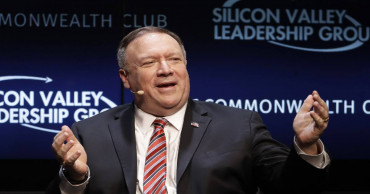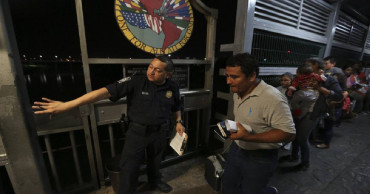US officials
'Frequent visits' by US officials a good development: Foreign Minister
Foreign Minister Dr AK Abdul Momen today said Bangladesh remains “constructive and very positive” to address any gaps and wants to develop a “much better relationship” with the United States.
“We are very happy that our constructive engagement with the USA is increasing,” he told reporters at the Ministry of Foreign Affairs – noting that there is reason for a much better relationship between the two countries.
Momen said Bangladesh and the US believe and pursue the same values and principles like democracy and respect for human rights.
“We might have gaps or weaknesses somewhere and we have taken corrective actions when the friendly country raised such issues,” he said, referring to measures taken regarding the Digital Security Act (DSA).
Momen said they observed some weaknesses in the DSA, but by and large it was rectified.
Also Read: Up to PM to decide whether Momen will remain foreign minister or not: Quader
Responding to a question, the foreign minister said they welcome constructive engagement and have always said there is a set procedure if anyone has anything to say. “We remain very positive. If there is anything lacking, they will tell us officially. We will resolve it,” he added.
He said there had been not a single case of enforced disappearance over the last three years as far as his knowledge goes, which he sees as a great improvement.
“Five fingers of the hand are not equal. We take care of things if anyone creates any problem,” Momen said, adding that there had been no excesses from the RAB for many years.
Momen said the elite force developed much maturity over the years and they have an in-built accountability system.
“We don’t want to see any injustice anywhere,” said the foreign minister.
Asked about the two proposed agreements – General Security of Military Information Agreement (GSOMIA) and the Acquisition Cross-Servicing Agreement (ACSA) – with the US, Momen said, “Our major focus is people’s welfare. But to protect our economic development, security is also essential.”
He said Bangladesh maintains multifaceted relations with the US including trade and investment, and the two countries work together in the areas of peacekeeping, counterterrorism, climate issues and maritime security.
“They (US) have assisted us to keep the maritime boundary more secure,” said the minister.
Momen referred to US President Joe Biden’s recent remarks acknowledging their enduring partnership with Dhaka and terming Bangladesh’s economic growth in the past 50 years “a remarkable story”.
“I hope our nations will continue to work on democratic governance, climate change, refugees, and maritime security. We are invested in your success and support the ability of all Bangladeshis to freely participate in and contribute to their country's development,” Biden said, accepting the credentials of the newly-appointed Bangladesh Ambassador to the US, Muhammad Imran, at the White House.
Asked about the frequent visits by US officials, Momen said this is a rather good development that engagement between the two countries is growing and it also reflects that there are growing opportunities in Bangladesh.
3 years ago
US officials recommend shorter COVID isolation, quarantine
U.S. health officials on Monday cut isolation restrictions for asymptomatic Americans who catch the coronavirus from 10 to five days, and similarly shortened the time that close contacts need to quarantine.
Centers for Disease Control and Prevention officials said the guidance is in keeping with growing evidence that people with the coronavirus are most infectious in the two days before and three days after symptoms develop.
The decision also was driven by a recent surge in COVID-19 cases, propelled by the omicron variant.
Early research suggests omicron may cause milder illnesses than earlier versions of the coronavirus. But the sheer number of people becoming infected — and therefore having to isolate or quarantine — threatens to crush the ability of hospitals, airlines and other businesses to stay open, experts say.
CDC Director Rochelle Walensky said the country is about to see a lot of omicron cases.
“Not all of those cases are going to be severe. In fact many are going to be asymptomatic,” she told The Associated Press on Monday. “We want to make sure there is a mechanism by which we can safely continue to keep society functioning while following the science.”
Last week, the agency loosened rules that previously called on health care workers to stay out of work for 10 days if they test positive. The new recommendations said workers could go back to work after seven days if they test negative and don’t have symptoms. And the agency said isolation time could be cut to five days, or even fewer, if there are severe staffing shortages.
Read: 3 teens killed, 1 injured in gas station shooting in U.S. Texas
Now, the CDC is changing the isolation and quarantine guidance for the general public to be even less stringent.
The change is aimed at people who are not experiencing symptoms. People with symptoms during isolation, or who develop symptoms during quarantine, are encouraged to stay home.
The CDC’s isolation and quarantine guidance has confused the public, and the new recommendations are “happening at a time when more people are testing positive for the first time and looking for guidance,” said Lindsay Wiley, an American University public health law expert.
Nevertheless, the guidance continues to be complex.
ISOLATION
The isolation rules are for people who are infected. They are the same for people who are unvaccinated, partly vaccinated, fully vaccinated or boosted.
They say:
—The clock starts the day you test positive.
—An infected person should go into isolation for five days, instead of the previously recommended 10.
—At the end of five days, if you have no symptoms, you can return to normal activities but must wear a mask everywhere — even at home around others — for at least five more days.
—If you still have symptoms after isolating for five days, stay home until you feel better and then start your five days of wearing a mask at all times.
QUARANTINE
The quarantine rules are for people who were in close contact with an infected person but not infected themselves.
For quarantine, the clock starts the day someone is alerted they may have been exposed to the virus.
Previously, the CDC said people who were not fully vaccinated and who came in close contact with an infected person should stay home for at least 10 days.
Read: Covid-19: Bangladesh begins booster vaccination
Now the agency is saying only people who got booster shots can skip quarantine if they wear masks in all settings for at least 10 days.
That’s a change. Previously, people who were fully vaccinated — which the CDC has defined as having two doses of the Pfizer or Moderna vaccines, or one dose of the Johnson & Johnson vaccine — could be exempt from quarantine.
Now, people who got their initial shots but not boosters are in the same situation as those who are partly vaccinated or are not vaccinated at all: They can stop quarantine after five days if they wear masks in all settings for five days afterward.
FIVE DAYS
Suspending both isolation and quarantine after five days is not without risk.
A lot of people get tested when they first feel symptoms, but many Americans get tested for others reasons, like to see if they can visit family or for work. That means a positive test result may not reveal exactly when a person was infected or give a clear picture of when they are most contagious, experts say.
When people get infected, the risk of spread drops substantially after five days, but it does not disappear for everyone, said Dr. Aaron Glatt, a New York physician who is a spokesman for the Infectious Diseases Society of America.
“If you decrease it to five days, you’re still going to have a small but significant number of people who are contagious,” he said.
That’s why wearing masks is a critical part of the CDC guidance, Walensky said.
VARYING RECOMMENDATIONS
The new CDC guidance is not a mandate; it’s a recommendation to employers and state and local officials. Last week, New York state said it would expand on the CDC’s guidance for health care workers to include employees who have other critical jobs that are facing a severe staffing shortage.
It’s possible other states will seek to shorten their isolation and quarantine policies, and CDC is trying to get out ahead of the shift. “It would be helpful to have uniform CDC guidance” that others could draw from, rather than a mishmash of policies, Walensky said.
Given the timing with surging case counts, the update “is going to be perceived as coming in response to pressure from business interests,” Wiley said. But some experts have been calling for the change for months, because shorter isolation and quarantine periods appeared to be sufficient to slow the spread, she said.
The move by CDC follows a decision last week by U.K. officials to reduce the self-isolation period for vaccinated people who test positive for COVID-19.
4 years ago
US officials: Biden proposes 5-year extension of nuke treaty
The Biden administration is proposing to Russia a five-year extension of the New START treaty limiting the number of U.S. and Russian strategic nuclear weapons, U.S. officials said Thursday.
5 years ago
US officials cite deterrence to defend lethal drone strike
For all of the Trump administration's insistence that the threat of an "imminent" attack led to the American drone strike on Iran's top general, U.S. officials behind the scenes say the strike was motivated as much, if not more, by a broader effort to rein in a dangerously emboldened Iran.
6 years ago
Migrants thrust by US officials into the arms of the cartels
The gangsters trawling Nuevo Laredo know just what they’re looking for: men and women missing their shoelaces.
6 years ago








